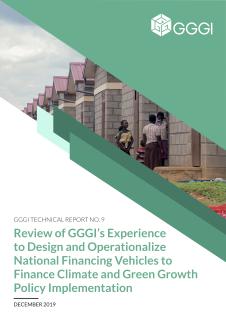
GGGI has identified national financing vehicles (NFVs) as a potential solution to overcome some of the known disadvantages of international climate finance. In particular, NFVs have the effect of creating (1) stronger alignment with national priorities, (2) reduced barriers to access for smaller organisations and even individuals or households that do not have the capacity to access international climate finance directly, (3) the rapid deployment of climate funds into projects in sectors of strategic national importance, and (4) an expanded capital base for scale-up following the initial phase of NFV.
In nine countries—Colombia, Costa Rica, Ethiopia, India, Jordan, Mongolia, Rwanda, Senegal, and Vanuatu—GGGI has worked on the design, or redesign, and operationalisation of new or existing NFVs. This paper reviews GGGI’s experience, considers lessons learned for future NFV projects that GGGI expects to undertake, and shares the organization’s experience with others active in the climate finance space.
It is recognized that the majority of the NFVs reviewed are at an early stage, and the experience analyzed concerns the development stage, rather than operation. This implies that the conclusions drawn here will need to be revisited as more experience is gained during operation. For each of the nine NFVs, analysis has looked at the design, build, and operational stages in NFV development as well as the special conditions and issues that can affect the success or failure of NFVs. The main conclusions are summarised to help the development of further NFVs.
